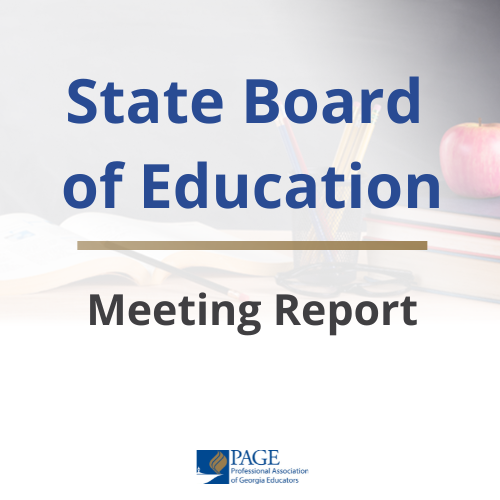Special Report: State Board of Education Called Meeting & Passage of Resolution
- Jun 3, 2021
- 3 min read
By a vote of 11 to 2, the State Board of Education approved a non-binding resolution outlining its beliefs about how race should be taught in Georgia’s classrooms. The board’s action came at a special called meeting on June 3, which was held by conference call. The resolution responds to a letter Gov. Brian Kemp sent to the board in May urging it to ensure that Critical Race Theory is not taught in public schools. Kemp applauded the board's approval of the resolution shortly after the conclusion of the meeting. Other states are debating similar resolutions on Critical Race Theory and how race is taught in the classroom - a topic that has become a key talking point for the GOP in the upcoming election cycle. Several district GOP conventions that met in mid-May approved resolutions opposing Critical Race Theory in advance of the 2021 State Convention of the Georgia GOP, which begins today, June 4, and concludes on June 5.
A recording of the board meeting is available here.
Opening their discussion, Board Chair Scott Sweeney emphasized the resolution does not require school districts or educators to change the curriculum they teach or how they teach it. Decisions about curriculum are made by school districts while the state board approves the state’s performance standards.
Board members had different perspectives on the resolution. One supporter, Helen Rice, saw it as ensuring that diversity is respected and that different groups are not set against each other. Mike Royal, who also favored the resolution, asserted that it does not prevent teachers from using culturally relevant pedagogies. Kenneth Mason, who voted against the resolution, held that the resolution excuses the racism that he, his children, and many others experience. He also expressed concern that not all board members were included in discussions on the resolution prior to the meeting. Tracey Pendley, the current Georgia Teacher of the Year and non-voting board member, noted that educators strive to include multiple perspectives when providing instruction on complex issues and raised the concern that teachers will be deterred from having these discussions under the resolution. Leonte Benton, who also opposed the resolution, and Mason, two of the three Black members of the board, each asked if the vote could be delayed to work through some of the issues being raised.
Prior to the vote, some board members - including Dr. Butch Mosely and Dr. Stan DeJarnett, both long-time educators - expressed hesitancy in rushing a vote on a resolution that all board members did not agree with. They sought to resolve differences among board members by requesting amendments from those who opposed the resolution. Mason responded that, while he is appreciative of their efforts, his opposition to the resolution could not be solved with amendments. There were no substantive amendments to the resolution.
Board members voted on the resolution as follows:

District 1 - Mike Long - Yes
Distrcit 2 - Dr. Butch Mosely - Yes
District 3 - Helen Rice - Yes
District 4 - Lisa Kinnemore - Yes
District 5 - Kenneth Mason - No
District 6 - Scott Sweeney - Yes
District 7 - Mike Royal - Yes
District 8 - Jason Downey - Did not vote (not present)
District 9 - Martha Zoller - Yes
District 10 - Dr. Stan DeJarnett - Yes
District 11 - Scott Johnson - Yes
District 12 - Matt Donaldson - Yes
District 13 - Leonte Benton - No
District 14 - Phenna Petty - Yes
*Refer to the map on the right to find your board member.
“Discussions about race and its place in our history and in current events are an important part of education and one that Georgia educators will continue to address,” observes Craig Harper, PAGE executive director. “The resolution adopted by the State Board of Education in this special called session is non-binding and, therefore, does not prohibit educators from continuing to teach and discuss all aspects of our history as they do now. Yet, the manner in which the resolution was drafted without input from all board members, and then rushed to a vote is troubling. The board members’ conversation, including concerns voiced by some voting for the resolution as well as those in dissent, highlights the importance of including more people and perspectives. Our many communities and educators, who have valuable insights and expertise, must work together to determine how Georgia will address these issues moving forward.”
The board may return to this issue. The resolution directs the board to consider codifying components of it. The board will hold its regular monthly meetings on June 16 and 17.
PAGE will continue to advocate for educators’ ability to address issues of race in classrooms and schools and will report on any further action taken on or because of the board resolution.



